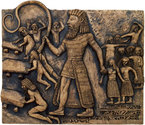 David Szostak has been a 6th Grade Tutor at the Saint Thomas Aquinas Tutorial in Maryland while pursing a doctorate in Theology at the Pontifical John Paul II Institute for Marriage and Family in Washington, DC.
David Szostak has been a 6th Grade Tutor at the Saint Thomas Aquinas Tutorial in Maryland while pursing a doctorate in Theology at the Pontifical John Paul II Institute for Marriage and Family in Washington, DC.
Most modern schools are obsessed with regurgitation education. This education requires students to routinely cough up undigested facts which they have stored in their short term memory but have failed to learn their meaning and significance. Students routinely inquire, “Is this going to be on the test?” They ask because facts appear only to matter insofar as it enables them to pass tests so that they can move on to the next grade and stay with their friends. Frequent standardized testing fails to foster or assess understanding. In contrast, classical education aims to reveal why facts matter and how they fit together. This understanding takes knowledge about facts a giant leap further. Yet, without standardized tests how is a teacher capable of knowing that students have not only knowledge of facts, but also an understanding of why they matter and how they fit together?[restrict]
The Saint Thomas Aquinas Tutorial (STAT) in Maryland, where I tutor 6th grade Humanities, is a hybrid-homeschooling system which hopes to foster genuine understanding so that students will be able to apply their knowledge even outside of tests. Our sixth grade Humanities covers the Old Testament and Ancient History, so we discuss many big ideas, such as who God is and what man’s purpose is. My students attend classes two days a week when I introduce and summarize material. During the three days of the week when students are not in class, they read and discuss assignments with their families. Because we are not required to meet arbitrary academic standards, STAT has provided me with tremendous freedom in assessing the depth of students’ understanding. Although my methods are not proven per se, I have been immensely surprised by the profound grasp students have displayed during the testing formats I provide.
 At the end of each quarter I host a game show quiz to assess student comprehension. I allow each student at least one day at home to study their class notes and review what they have read for the quarter. Perhaps I should provide a study guide with specific topics, but I have not yet. My class of 12 students is broken up into six teams of two pupils. Each quiz consists of multiple rounds, each with its own rules. The first round asks a simple list of questions: Name 4 of Joseph’s brothers; name 3 cities in Mesopotamia; what did Moses do to part the Red Sea? The students will earn a point for each question answered correctly. If they are incorrect, another table will get a chance to answer it for two points, raising the stakes and adding motivation to work hard (surely there is nothing worse than granting your classmates an advantage because you didn’t study well!). Whichever team earns the most points wins a homemade treat I bring in, such as chocolate angel food cake baked from a secret family recipe. A later round of the game show quiz awards several points for orally answering essay questions. For example, why did Adam and Eve disobey God and eat the apple from the tree? If a team says it is because the serpent tricked them, I will offer partial credit. However, I will award full credit to the team who answers that Adam and Eve ate the fruit because they doubted God’s goodness and no longer trusted that the He would fulfill their deepest desires. This is St. Bonaventure’s answer which we had discussed earlier in class. One team was able to answer this question fully, which showed that they had gained both a memorization of some of the facts of the Biblical account, and also that they understood why what happened in the Bible actually happened. Consequently, those students could begin to understand that every sin fundamentally results from a lack of trust in God’s goodness.
At the end of each quarter I host a game show quiz to assess student comprehension. I allow each student at least one day at home to study their class notes and review what they have read for the quarter. Perhaps I should provide a study guide with specific topics, but I have not yet. My class of 12 students is broken up into six teams of two pupils. Each quiz consists of multiple rounds, each with its own rules. The first round asks a simple list of questions: Name 4 of Joseph’s brothers; name 3 cities in Mesopotamia; what did Moses do to part the Red Sea? The students will earn a point for each question answered correctly. If they are incorrect, another table will get a chance to answer it for two points, raising the stakes and adding motivation to work hard (surely there is nothing worse than granting your classmates an advantage because you didn’t study well!). Whichever team earns the most points wins a homemade treat I bring in, such as chocolate angel food cake baked from a secret family recipe. A later round of the game show quiz awards several points for orally answering essay questions. For example, why did Adam and Eve disobey God and eat the apple from the tree? If a team says it is because the serpent tricked them, I will offer partial credit. However, I will award full credit to the team who answers that Adam and Eve ate the fruit because they doubted God’s goodness and no longer trusted that the He would fulfill their deepest desires. This is St. Bonaventure’s answer which we had discussed earlier in class. One team was able to answer this question fully, which showed that they had gained both a memorization of some of the facts of the Biblical account, and also that they understood why what happened in the Bible actually happened. Consequently, those students could begin to understand that every sin fundamentally results from a lack of trust in God’s goodness.
How do the students react to this game show quiz? I honestly can’t keep them sitting in their seats. I need to strictly enforce some rules so that the speed-based round doesn’t get out of hand. Sometimes one teammate needs to shush the other so that they won’t blurt out an answer during another team’s turn. Because I don’t directly tie their grades to their performance on the quiz the kids have no idea that it contributes to their grade. They are simply excited to be playing a game and striving to earn a prize that no one else in the class will get.
 My literature final exam is formatted differently, but because the students don’t know they are being tested, they don’t act like it is a test. I require each of the students to vote for their favorite protagonist and most despised antagonist from the fictional books we have read from the year and to support this choice with examples from the text. I arrange the protagonists into a series of brackets which compares the characters with each other. Before the students vote anonymously for who advances in the tournament, they debate which character was better. Each of the students who present passionate arguments on behalf of one character over another demonstrate broad comprehension of the books we have read and present this to the class using logic and rhetoric.
My literature final exam is formatted differently, but because the students don’t know they are being tested, they don’t act like it is a test. I require each of the students to vote for their favorite protagonist and most despised antagonist from the fictional books we have read from the year and to support this choice with examples from the text. I arrange the protagonists into a series of brackets which compares the characters with each other. Before the students vote anonymously for who advances in the tournament, they debate which character was better. Each of the students who present passionate arguments on behalf of one character over another demonstrate broad comprehension of the books we have read and present this to the class using logic and rhetoric.
These tournaments are even more raucous than the game show quizzes. I can guarantee that my students aren’t likely to forget the match between Digory from The Magician’s Nephew and Gilgamesh. Based on arguments by the boys in my class, the students voted that Gilgamesh was far superior to Digory due to his ability to expertly wield large weapons. The elimination of Digory from the tournament left the girl who presented him as her favorite character quite dismayed.
So, does any of this work? Can I prove that these testing methods are superior to  regurgitation education? Truthfully, it has become apparent to me that (just as with any human endeavor) the more effort students apply and the harder they work, the more they benefit from this model of “testing.” If the majority of the class is unmotivated or simply does not complete many of the assignments, then this neo-classical model of testing does not work. It simply does not have much penal force to coerce students to perform better. My method works because it strongly and publically rewards hard work, not because it penalizes laziness. Further, because I am working with a very small class and verbally discussing the material with them several times each week, it is possible for me to daily gauge whether or not students remain engaged with the material. When problems arise, I can actively appeal to the families of the students who are actively involved to motivate the students outside of the classroom. In my current situation I am very surprised how seldom I have faced academic problems—behavioral problems are another matter entirely—and this has allowed this testing method to thrive.
regurgitation education? Truthfully, it has become apparent to me that (just as with any human endeavor) the more effort students apply and the harder they work, the more they benefit from this model of “testing.” If the majority of the class is unmotivated or simply does not complete many of the assignments, then this neo-classical model of testing does not work. It simply does not have much penal force to coerce students to perform better. My method works because it strongly and publically rewards hard work, not because it penalizes laziness. Further, because I am working with a very small class and verbally discussing the material with them several times each week, it is possible for me to daily gauge whether or not students remain engaged with the material. When problems arise, I can actively appeal to the families of the students who are actively involved to motivate the students outside of the classroom. In my current situation I am very surprised how seldom I have faced academic problems—behavioral problems are another matter entirely—and this has allowed this testing method to thrive.
No student learns everything presented during the academic year well. Even if they were able to commit everything to short term memory for a test, they are liable to forget it for the rest of their lives. As a result, my final assignment for the year requires each student spend two minutes telling the class and me about the most important thing learned during the year. One student described how much he benefited from Lectio Divina and planned to pray it more frequently. Another student related that she learned about allegory and she finally realized that Aslan is a metaphor for Christ. At the end of the presentation, I require each student to ask a question that has been unresolved during the year. Asking a genuinely worthwhile question displays that enough has been learned during the year to begin thinking about it at a deeper level. Students have asked, “So, how does the Trinity work?” and “Why didn’t God simply come down and fix everything once people started killing each other?” To my amazement, these students have displayed genuine understanding and insight into at least some part of this year’s material which will carry them through the rest of their lives. And for my sake, it is much more interesting to hear students enthusiastically debate about Digory and Gilgamesh than ensuring they correctly filled in bubbles by pencil.
Post-script — A STAT mom’s comment:
After one month in Mr. Szostak’s class, my daughter confided to me, “You know, Mom, you might not believe this, but the Bible can be really interesting.” This was the first of many hilarious comments that betrayed the great work being done in humanities class. One year later, she still wakes up to read her Bible alone in silence. We still laugh about memorable moments interpreting Scripture, losing, and winning the various competitions and arguments. Thank you, David Szostak for sharing your love of life and Scripture with the students of St. Thomas Aquinas Tutorial!
[/restrict]
